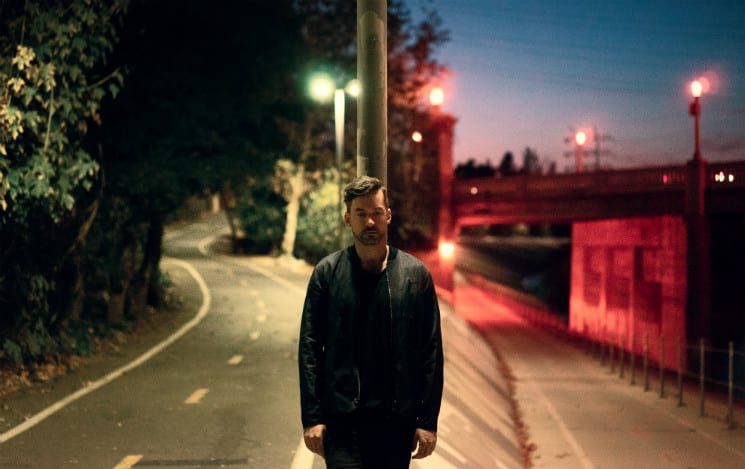"Where do you live?" seems like a simple enough — if not slightly intrusive — question. But ask that of Bonobo (aka Simon Green) while he was recording his latest record, and you may have been met with a blank look and a shrug of the shoulders. Green is now firmly situated in L.A., but the guts of Migration were recorded at various points around the globe, which is what led to the album's title and eventually its overarching theme of cultural diaspora.
At its core, Migration is about the movement of people and their loose connections worldwide. "It comes down to that whole idea — just the effect that people have on their spaces and how people take their culture, travel with it, and then plant it elsewhere," Green says.
While his stint as a nomad provided a neat thematic mould to work within, it clearly had a huge sonic influence too. As an album in transit, Migration was both recorded during, and for, those long stares out the window. The soporific loops that usher in the title track start a sentimental drift from cloud to cloud that's only briefly disturbed by the more turbulent moments of subsonic thump and 2-step percussion. Yet even these rougher tracks are still ethereal enough that they might just float into the ozone and join their tender comrades — "Kerala" has that uplifting harp and warm, encouraging vocals, while "Outlier" eventually disintegrates into a mist of muted strings and keys. Put simply, Migration is Bonobo's most reflective work to date.
This gaze inward is juxtaposed with a gaze forward. Green ultimately thinks music needs to be "a reflection of the era you're living in," and that it has to evolve. "You can't live in the times that you live in and be exposed to all the new music that's happening, ignore it all, and carry on doing the same stuff as you were ten years ago," says Green. "You have to engage with the current palette of the world, and what that sounds like. What it sounds like in 2016 is a pretty different place [to early 2000s]. I think nostalgia is kind of dangerous in music."
Despite this sentiment, Migration is still reflective at times. While it doesn't totally harken back to his earlier albums, it's by no means a sea change either. Any long-term fans will likely get an occasional shiver that brings them right back to the jazzy trip-hop of Animal Magic and Dial 'M' for Monkey. What we have here is a quick nod to the downtempo roots of his inaugural works, but with the deft execution of a practiced hand. What was once hazy is now sharp and defined, a crystal clear example of a sound evolved. Migration is a record that knows exactly where it came from but isn't afraid to look into the beyond. If nostalgia could ever be seen as forward-thinking, then it's here.
At its core, Migration is about the movement of people and their loose connections worldwide. "It comes down to that whole idea — just the effect that people have on their spaces and how people take their culture, travel with it, and then plant it elsewhere," Green says.
While his stint as a nomad provided a neat thematic mould to work within, it clearly had a huge sonic influence too. As an album in transit, Migration was both recorded during, and for, those long stares out the window. The soporific loops that usher in the title track start a sentimental drift from cloud to cloud that's only briefly disturbed by the more turbulent moments of subsonic thump and 2-step percussion. Yet even these rougher tracks are still ethereal enough that they might just float into the ozone and join their tender comrades — "Kerala" has that uplifting harp and warm, encouraging vocals, while "Outlier" eventually disintegrates into a mist of muted strings and keys. Put simply, Migration is Bonobo's most reflective work to date.
This gaze inward is juxtaposed with a gaze forward. Green ultimately thinks music needs to be "a reflection of the era you're living in," and that it has to evolve. "You can't live in the times that you live in and be exposed to all the new music that's happening, ignore it all, and carry on doing the same stuff as you were ten years ago," says Green. "You have to engage with the current palette of the world, and what that sounds like. What it sounds like in 2016 is a pretty different place [to early 2000s]. I think nostalgia is kind of dangerous in music."
Despite this sentiment, Migration is still reflective at times. While it doesn't totally harken back to his earlier albums, it's by no means a sea change either. Any long-term fans will likely get an occasional shiver that brings them right back to the jazzy trip-hop of Animal Magic and Dial 'M' for Monkey. What we have here is a quick nod to the downtempo roots of his inaugural works, but with the deft execution of a practiced hand. What was once hazy is now sharp and defined, a crystal clear example of a sound evolved. Migration is a record that knows exactly where it came from but isn't afraid to look into the beyond. If nostalgia could ever be seen as forward-thinking, then it's here.




